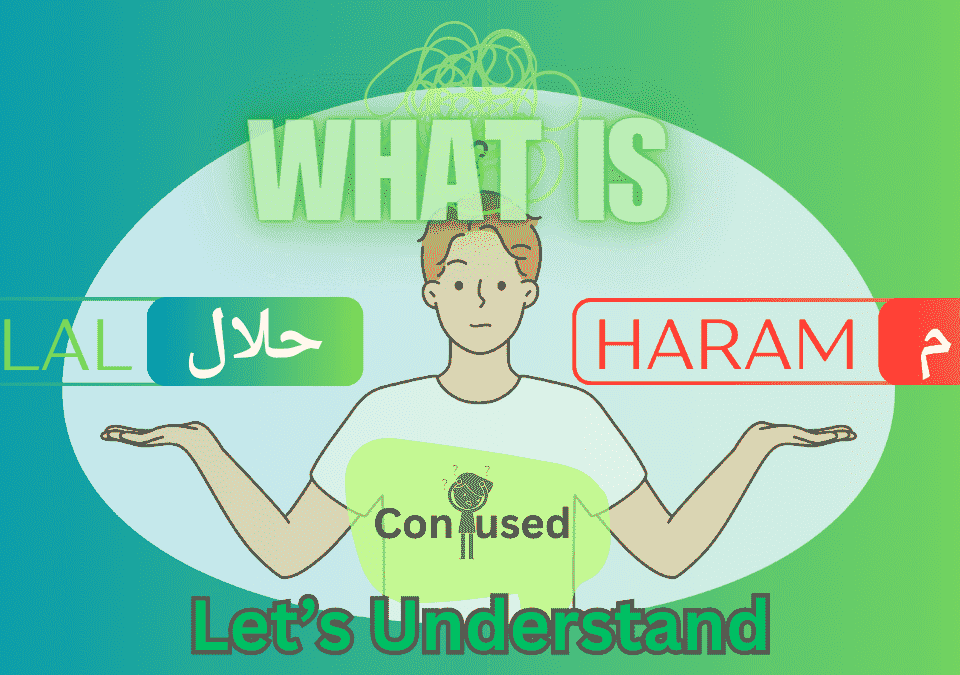
The Power of Repentance: Seeking Forgiveness from Allah
2024-05-03
Everything You Should Know About Tauheed: Allah’s Oneness in Islam.
2024-05-13Understanding Halal and Haram in Islam
In Islam, the concepts of Halal (permissible) and Haram (forbidden) are fundamental principles that govern various aspects of life. They go beyond mere dietary restrictions and encompass a holistic approach to ethical conduct, societal interactions, and spiritual fulfillment. Let’s explore these concepts and their significance in Islam.
Quranic Foundation
The Quran is the holy book of Islam, considered the literal word of God revealed to Prophet Muhammad (peace be upon him). It contains divine injunctions that distinguish between what is permissible (Halal) and what is forbidden (Haram). The Quranic guidance covers matters of faith, worship, social ethics, and governance.
For example, Surah Al-Baqarah elucidates the dietary laws of Islam, prohibiting the consumption of intoxicants, blood, and the flesh of swine (2:173). The Quran emphasizes the importance of consuming what is lawful and wholesome, reflecting the underlying principle of purity and righteousness in all aspects of life. Similarly, Surah Al-Ma’idah (5:90–91) highlights the prohibition of gambling and the consumption of wealth acquired through illicit means.
The Sunnah: Exemplifying Ethical Behavior
The Sunnah comprises the teachings, actions, and approvals of Prophet Muhammad (peace be upon him). As the exemplar of ethical conduct, the Prophet’s life serves as a practical manifestation of the Quranic guidance. His sayings (hadith) and actions offer invaluable insights into the application of Halal and Haram in various spheres of life.
For instance, the Prophet Muhammad (peace be upon him) emphasized the importance of honesty and integrity in business transactions, stating, “The truthful and trustworthy businessman will be in the company of prophets, saints, and martyrs on the Day of Judgment” (Tirmidhi). Such teachings underscore the ethical imperative of upholding fairness and transparency in all dealings.
Dietary Laws: Beyond Meat and Methods of Slaughter
Halal principles extend beyond dietary restrictions to include the method of slaughter (Zabiha). This exemplifies the meticulous attention paid to the ethical treatment of animals and the sanctity of life in Islam. The prescribed method involves pronouncing the name of Allah (God) at the time of slaughter and ensuring the swift and humane death of the animal.
By adhering to the principles of Halal slaughter, Muslims affirm their commitment to ethical consumption and stewardship of the environment, reflecting the interconnectedness of faith and ethical conduct.
Ethical Conduct: Integrity in Interactions
In addition to dietary laws, Halal and Haram govern various aspects of social conduct and interpersonal relationships. Islam emphasizes treating others with kindness, respect, and fairness, regardless of differences in race, religion, or socioeconomic status. Acts of dishonesty, deceit, or exploitation are deemed Haram and are antithetical to the teachings of Islam.
The Quranic injunction to “speak justice” and “stand firm as witnesses for Allah, even against yourselves or your parents and relatives” (4:135) underscores the ethical imperative of upholding truth and justice in all circumstances.
Financial Transactions: Riba and Ethical Investment
Islam promotes equitable and just financial practices, free from exploitation and usury. The prohibition of riba (interest) reflects the ethical imperative of fairness and mutual benefit in financial transactions. Instead, Islam encourages trade, investment, and charitable giving as means of generating wealth and promoting socio-economic development.
Contemporary Challenges: Navigating Complexity
In the contemporary world, Muslims face challenges in navigating the principles of Halal and Haram amidst rapid globalization, technological advancements, and cultural diversity. Issues such as the permissibility of cryptocurrencies, the use of genetically modified organisms (GMOs) in food production, and the ethical implications of artificial intelligence (AI) pose complex dilemmas for Muslims seeking to adhere to their religious principles while embracing innovation and progress.
Ruqyah Services: Spiritual Healing and Protection
In addition to following the principles of Halal and Haram, seeking Ruqyah services can provide essential spiritual healing and protection. Ruqyah is an Islamic practice rooted in the recitation of Quranic verses and supplications for seeking cure and protection from various spiritual afflictions, including the evil eye, black magic, and jinn possession.
We offer professional Ruqyah services tailored to your individual needs. Our experienced practitioners provide personalized treatments, ensuring holistic well-being and spiritual balance. Seek spiritual healing and protection with Ruqyah to enhance your connection with Allah and safeguard yourself from negative energies.
Conclusion: Upholding Divine Guidance
In conclusion, the concepts of Halal and Haram constitute the bedrock of Islamic ethics, providing a comprehensive framework for ethical conduct, social justice, and spiritual fulfillment. Rooted in the Quranic revelation and exemplified by the teachings of the Prophet Muhammad (peace be upon him), these principles guide Muslims in their quest for righteousness and moral excellence.




